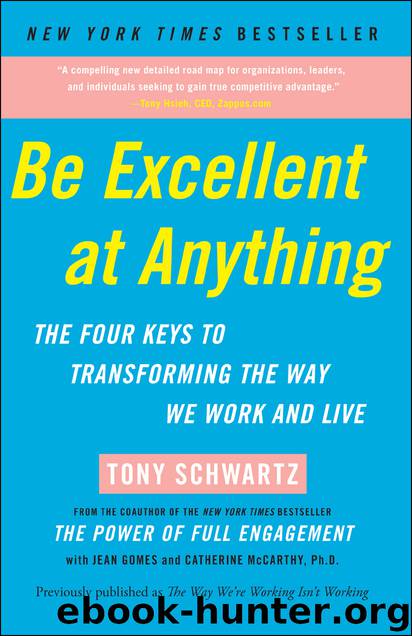Be Excellent at Anything by Tony Schwartz

Author:Tony Schwartz
Language: eng
Format: epub
Publisher: Free Press
FIRST, DO NO HARM
Because gestures of appreciation are so rare in most organizations, a little goes a long way. In one study, researchers found that giving a small gift of candy to medical residents improved the speed and accuracy of their diagnoses. Another study found that a 10 percent increase in something called “motivating language” from leaders boosted worker satisfaction by 10 percent and performance by 2 percent. The neuroanatomist Jill Bolte Taylor came to believe that positive encouragement lay at the heart of her recovery from a stroke that nearly killed her. “I needed those around me to be encouraging,” she wrote. “I needed to know that I still had value. I needed to have dreams to work toward. I needed people to celebrate the triumphs I made every day because my successes, no matter how small, inspired me.” Every leader would do well to heed Taylor’s prescription.
As simple as it seems, writing notes of appreciation is one of the basic behaviors we encourage in senior leaders. Doug Conant, the CEO of Campbell Soup Company, is said to write up to twenty handwritten messages a day to employees. He believes, as we do, that a note written by hand and sent through the mail is more personal and powerful for the recipient. At Wachovia, Ben Jenkins, now retired as president, created a ritual of taking one executive a week out to lunch. The only sit-downs he’d previously had with his direct reports were to hear monthly reports on their numbers or to give them yearly performance reviews. Instead, over meals, he made it a priority to recognize their accomplishments and to talk with them about their lives and their aspirations rather than their immediate work responsibilities.
As a young reporter at The New York Times, I was at my desk talking on the phone one morning when Joe Lelyveld, then a fast-rising editor at the paper, walked by. I barely knew him, but Lelyveld, who would one day become the paper’s managing editor, picked up a blank pad on my desk and wrote, “Yours is the best story in the paper today.” That incident occurred thirty years ago, and I still vividly remember its inspirational impact. I also recall clearly the sense of fear and dread that A. M. Rosenthal, the paper’s managing editor at the time, prompted among reporters whenever he walked through the newsroom. Rosenthal had an explosive temper, and his criticisms could be searing.
The Hippocratic Oath applies to physicians, but it’s just as relevant to leaders: First, do no harm. Because the impact of bad is stronger than good, the first rule for an effective leader is simply to avoid devaluing emotions: anger, intimidation, disparagement, and shame. In one of his most famous findings, John Gottman, a leading researcher in the field of marriage, discovered that in the most successful marriages, the number of positive interactions exceeds the negative ones by five to one. Put another way, it takes five positive comments to offset the impact of a single negative one.
Download
This site does not store any files on its server. We only index and link to content provided by other sites. Please contact the content providers to delete copyright contents if any and email us, we'll remove relevant links or contents immediately.
The 4-Hour Workweek, Expanded and Updated: Escape 9-5, Live Anywhere, and Join the New Rich by Timothy Ferriss(1342)
Women Who Work by Ivanka Trump(1247)
101 Things I Learned in Law School by Matthew Frederick(1222)
Master Your Next Move, with a New Introduction by Michael D. Watkins(1172)
Later-in-Life Lawyers: Tips for the Non-Traditional Law Student by Cooper Charles(1129)
Roadmap by Roadtrip Nation(1031)
The Book of Ruby(1014)
48 Laws of Power by Greene Robert(980)
Legal Guide for the Visual Artist by Tad Crawford(943)
A Job to Love by The School of Life(915)
How to Become a Video Game Artist by Sam R. Kennedy(901)
Rise by Patty Azzarello(871)
How to Fix Your Sh*t by Sháá Wasmund(826)
The 4-Hour Workweek by Ferriss Timothy(816)
Career GPS by Ella L. J. Edmondson Bell PhD(774)
Letters to a Young Scientist by Edward O. Wilson(733)
Career Development All-in-One For Dummies by Consumer Dummies(698)
How Successful People Think: Change Your Thinking, Change Your Life by John C. Maxwell(683)
Yesterday, I Cried: Celebrating the Lessons of Living and Loving by Iyanla Vanzant(670)
